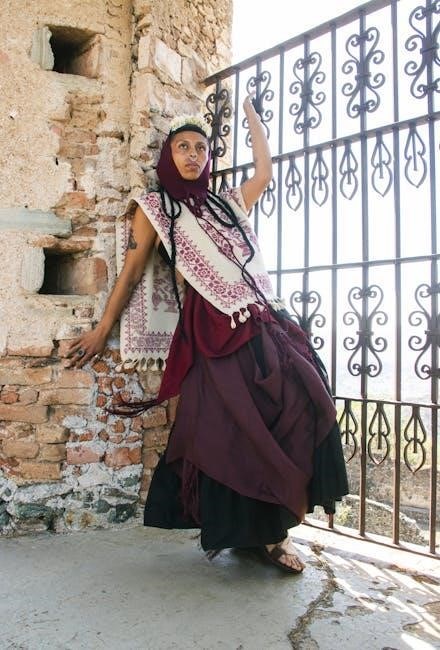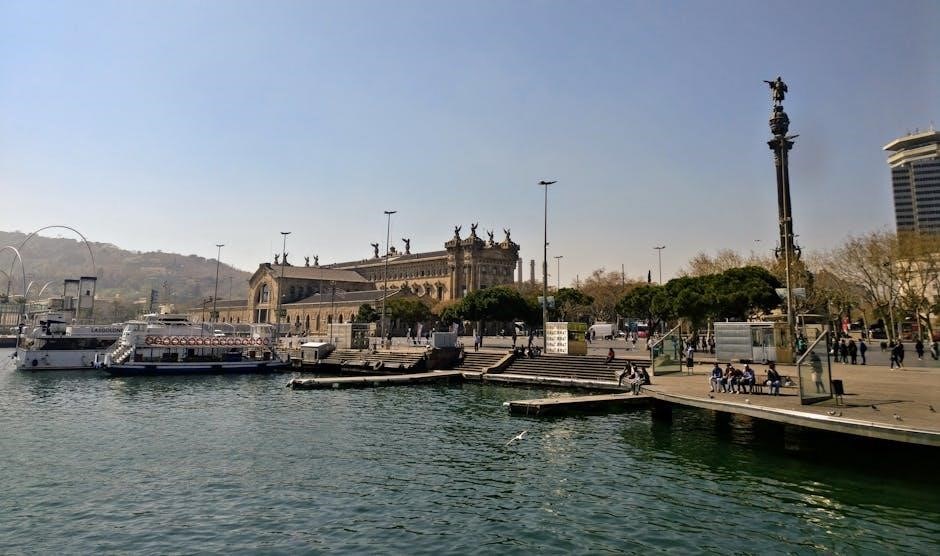
abou fares el dahdah pdf
Abou Fares el-Dahdah is a renowned professor and director at Rice University‚ specializing in modern architecture‚ urbanism‚ and digital geospatial platforms. His work on Brazilian architecture and Arabic grammar‚ notably the “Abou Fares el-Dahdah PDF‚” has significantly impacted academic and cultural discourse.
Overview of Abou Fares el Dahdah’s Contributions

Abou Fares el-Dahdah has made significant contributions to academia and cultural studies‚ particularly in modern architecture‚ urbanism‚ and digital geospatial platforms. His work bridges historical and contemporary perspectives‚ offering innovative insights into urban development. El-Dahdah’s research on Brazilian architecture‚ notably Brasilia and Rio de Janeiro‚ has been influential. He has also developed digital atlases to map urban evolution‚ enhancing our understanding of spatial and social changes. Additionally‚ his contributions to Arabic grammar and translation‚ as seen in the “Abou Fares el-Dahdah PDF‚” highlight his interdisciplinary approach. El-Dahdah’s leadership roles at Rice University and collaborative projects with global institutions underscore his commitment to advancing knowledge and fostering international academic exchange.

Academic Background and Career
Abou Fares el-Dahdah holds degrees from Rhode Island School of Design and Harvard University. He is a professor at Rice University‚ directing the Humanities Research Center.
Education and Professional Positions
Abou Fares el-Dahdah earned his undergraduate degrees in fine arts and architecture from the Rhode Island School of Design. He later pursued graduate studies at Harvard University’s Graduate School of Design‚ completing his master’s degree in 1989 and doctorate in 1992. El-Dahdah is currently a professor of humanities at Rice University‚ where he also serves as the director of the Humanities Research Center. He has held visiting fellow positions at the David Rockefeller Center for Latin American Studies and the Canadian Center for Architecture. His academic career is marked by a strong commitment to interdisciplinary research and innovation in education. El-Dahdah’s professional roles reflect his expertise in architecture‚ urbanism‚ and cultural studies‚ solidifying his reputation as a leading scholar in his field.
Major Publications and Writings
Abou Fares el-Dahdah’s notable works include the Abou Fares el-Dahdah PDF‚ focusing on Arabic grammar and Koran translation‚ which is widely recognized for its detailed analysis and cultural significance.
The “Abou Fares el Dahdah PDF” and Its Significance
The “Abou Fares el Dahdah PDF” is a comprehensive resource that delves into Arabic grammar and Koran translation‚ offering detailed linguistic analysis. It utilizes the translation by Mohammed Marmaduke Pickthall‚ noted for its accuracy. The PDF serves as a valuable tool for scholars and learners‚ providing insights into the structure and meaning of the Holy Quran. Its significance lies in its ability to bridge traditional textual analysis with modern digital accessibility‚ making it a widely referenced work in academic and cultural circles. The document’s meticulous approach to grammatical breakdown has made it indispensable for those seeking to deepen their understanding of Arabic scriptural texts.
Other Notable Publications and Research Works
Abou Fares el-Dahdah’s scholarly contributions extend beyond the “Abou Fares el Dahdah PDF” to include extensive research on modern architecture and urbanism‚ particularly in Brazil. His work‚ “Paisagens Fluidas e Rodoviarismo: Roberto Burle Marx e o Rio de Janeiro‚” explores the interplay between landscape design and urban development. Additionally‚ he has contributed to projects like the digital atlas of Rio de Janeiro’s spatial and social evolution. El-Dahdah has also led initiatives funded by the Getty Foundation‚ focusing on temporal cartography and archival preservation. His collaborative efforts with institutions such as Casa de Lucio Costa and Fundação Oscar Niemeyer underscore his commitment to preserving architectural heritage. These works collectively highlight his interdisciplinary approach to urban studies and cultural preservation‚ solidifying his reputation as a leading scholar in his field.
Research Interests and Expertise
Abou Fares el-Dahdah specializes in modern architecture‚ urbanism‚ and digital geospatial platforms‚ focusing on the historical and imagined evolution of cities through innovative cartographic tools and methodologies.
Focus on Modern Architecture and Urbanism
Abou Fares el-Dahdah’s research centers on modern architecture and urbanism‚ particularly in Brazil‚ where he has extensively studied the works of Lucio Costa and Oscar Niemeyer. His work highlights the spatial and social evolution of cities like Rio de Janeiro‚ where he co-develops a digital atlas chronicling the city’s history. El-Dahdah’s expertise also extends to the master plan of Brasilia‚ a project that reflects his deep understanding of urban design and its cultural implications. His collaborative projects with institutions such as Casa de Lucio Costa and Fundação Oscar Niemeyer underscore his commitment to preserving and advancing modern architectural heritage. Through his work‚ el-Dahdah bridges the gap between historical urbanism and contemporary digital mapping‚ offering innovative perspectives on how cities are imagined and transformed over time.
Development of Digital Geospatial Platforms

Abou Fares el-Dahdah has pioneered the development of digital geospatial platforms that map urban transformations over time. His work focuses on creating interactive tools that visualize historical and contemporary cityscapes‚ such as Rio de Janeiro. These platforms integrate temporal cartography and photography‚ offering a comprehensive understanding of urban evolution. Funded by grants from institutions like the Getty Foundation‚ el-Dahdah’s projects bridge academic research with public accessibility. His digital atlas of Rio de Janeiro‚ for instance‚ captures the city’s spatial and social changes‚ making it a valuable resource for scholars and planners. By combining historical data with modern technology‚ el-Dahdah’s platforms redefine how cities are studied and imagined‚ fostering interdisciplinary collaboration and innovation in urban studies.

Professional Contributions and Roles
Abou Fares el-Dahdah is a professor and director of Rice University’s Humanities Research Center. He leads key university committees and collaborates internationally on significant cultural projects.
Leadership Positions at Rice University
Abou Fares el-Dahdah holds prominent leadership roles at Rice University‚ including director of the Humanities Research Center and professor in the School of Humanities. He serves as chair of the University Committee on Information Technology and is a Baker Institute Faculty Scholar. Additionally‚ he is a member of the Faculty Advisory Committee for the Ken Kennedy Institute. His leadership extends across the university‚ fostering interdisciplinary collaboration and innovation. El-Dahdah’s work emphasizes the integration of technology and humanities‚ particularly through digital geospatial platforms. His contributions have strengthened Rice’s academic and research initiatives‚ positioning the university as a leader in both technological and cultural studies.
Collaborative Projects and International Involvement
Abou Fares el-Dahdah has engaged in numerous collaborative projects and international initiatives‚ showcasing his commitment to global academic and cultural exchange. He has worked closely with institutions such as Casa de Lucio Costa and Fundação Oscar Niemeyer in Brazil‚ focusing on modern architecture and cultural preservation. El-Dahdah co-developed a digital atlas of Rio de Janeiro‚ mapping its spatial and social evolution. Additionally‚ he served as a Visiting Fellow at the David Rockefeller Center for Latin American Studies and the Canadian Center for Architecture‚ further expanding his international influence. These collaborations highlight his dedication to bridging cultural and academic gaps‚ fostering innovation in urban studies and architectural history on a global scale.
Abou Fares el-Dahdah’s work bridges cultural gaps‚ advancing architectural and urban studies globally. His contributions‚ including the “Abou Fares el-Dahdah PDF‚” leave a lasting legacy in academia and beyond.
Legacy and Impact of Abou Fares el Dahdah’s Work
Abou Fares el-Dahdah’s work has left an indelible mark on academia and cultural discourse. His research on modern Brazilian architecture and urbanism‚ particularly the development of Rio de Janeiro’s digital atlas‚ has reshaped how cities are studied historically and spatially. As a professor and director of the Humanities Research Center at Rice University‚ his leadership has fostered interdisciplinary collaboration and innovation. The “Abou Fares el-Dahdah PDF” serves as a testament to his dedication to Arabic grammar and translation‚ bridging cultural and linguistic gaps. His contributions to geospatial platforms and architectural history continue to inspire scholars globally‚ ensuring his work remains a cornerstone in these fields for future generations.
His legacy is defined by his ability to merge technology‚ history‚ and culture seamlessly.